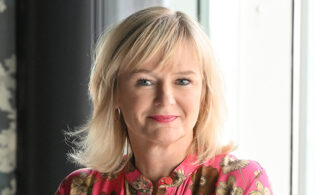Whether you were shuttling back and forth between the IET and The Savoy or traipsing to the 40-odd events across London last week, it was indeed a busy week for the global media business in the British capital.
The London TV Screenings organizers hailed a record 850 buyers. RX said at the end of last week that the inaugural MIP London had more than 2,800 delegates from 80-plus countries, including 1,000 registered buyers. Attendance was largely from Europe, followed by North America, with significant delegations from Asia, LatAm, MENA and Turkey. Over 70 companies took meeting spaces, including country pavilions from Belgium, China, France, Korea and Spain.
“It exceeded expectations,” Lucy Smith, director of MIP London and MIPCOM Cannes, tells World Screen. “Our goal was always to bring in more of the international audience, and more people from across the value chain to what has become such a busy week for content in London. We demonstrated the value of a central hub, and the conversations we have been having since are extremely positive, pointing to the additional people and business opportunities that it created rather than any detrimental effect on existing events.”
Inside The Savoy and the IET, the first two and a half days of the event were certainly busy across the market floors, networking lounges and conference events. As the London TV Screenings schedule picked up on Tuesday, however, the halls of the two venues started to feel a little empty as buyers headed off to the disparate events taking place across the city. As such, feedback from distributors inside MIP London has been mixed. The conference schedule, however, was overwhelmingly well-received based on feedback I received and the consistently packed Kelvin Theatre when it came to the sessions focused on the challenges of the business today and how companies are course-correcting.
The buzziest session in terms of star power was, of course, the wide-ranging conversation between Netflix’s Bela Bajaria and David Beckham about the evolution of his career and his work at Studio 99. It was the panels focused on streamer strategies, AI, the creator economy and audience engagement, however, that delivered the kind of intelligence distributors, producers and buyers are looking for as they make sense of the new normal.
“The streaming wars are over,” said Evan Shapiro in his opening remarks before sitting down for a series of Q&As on streaming strategies, beginning with his conversation with Justin Sampson, chief executive of Barb. “Netflix won. Biggest subscription channel on the face of the Earth. The only one that’s truly profitable from a big streaming standpoint. Now, they’re turning into TV with football and wrestling and a slap match between a YouTuber and an old man. We are now in what I would call the Great Media War. The Great Media War is not necessarily between entities. It’s between mindsets. It’s between the models that we can’t seem to let go of and keep trying to re-create in this new user-centric era and the ones we have to build while we’re operating the businesses we have. Yes, we have to fly the plane and build a new plane at the same time. We have to let go of the things that are holding us back and move toward understanding the data that’s staring us in the face.”
And the data staring us in the face is telling us that YouTube is increasingly winning the battle for the living room TV set. IP owners should not be scared to work with the platform, Pedro Pina, VP for EMEA at YouTube, said in his conversation with Shapiro.
“There are a lot of fears for what it represents and does,” Pina said. “We are an open platform. We exist to provide the ability for creators to upload the content and make it available in the country where they operate or globally if they want. It’s a massive opportunity to reach a wider audience. We have no interest whatsoever in producing our own content. We’ve tried it a little bit. We did a few experiments. We realized that as a company—Alphabet overall—we are very good at producing platforms. Look at Chrome, Search, YouTube, Android, Google TV, etc. We’re not interested in producing content. Our commercial success will only exist if other people are successful. Our mission is to give that content to users around the world. But we need to have it. It’s critical that whoever uses our platform is successful.”
Hannah Blyth, head of TV at Prime Video in the U.K., and Kai Finke, chief content officer at SkyShowtime, in discussing the theme of what streamers want, articulated new approaches to windowing and collaboration. “We need to look at the creativity of the collaborative approach and financing projects together and building audiences together,” Finke said. “We are in growth mode. We are investing. We’re trying to find a big, meaningful audience for the great movies and TV shows from both of our shareholders. We’re looking for projects that we can potentially do together with partners.”
The lineup of screenings at MIP London was also well-received, with positive feedback from those companies that opted to use the IET to unveil new productions.
“As a new market, there was a lot of uncertainty regarding its success,” says Nadav Palti, president and CEO of Dori Media Group, which held a screenings event for its new horror comedy series Soul Sucker. “Given Dori Media’s many years of experience with RX, we had confidence that their team would manage it in the best possible way. Indeed, we are happy that it met our expectations; the venue was impressive; the booth, The Savoy, the IET and all the exhibition spaces were well-organized; and the RX team was always available to assist. And even our screening of Soul Sucker, which we chose to host in addition to being distributors, exceeded our expectations.”
Similarly, Megumi Shirokawa, co-director of the international business department at TV Asahi Corporation, highlighted the success of the SONG vs DANCE format launch. “MIP London was an extremely valuable experience for TV Asahi. We had the honor of hosting a panel session, which allowed us to showcase our new co-production format SONG vs DANCE in collaboration with Smart Dog Media. The response was overwhelmingly positive, which was very encouraging. Additionally, the event’s location in London was advantageous as it facilitated meetings with companies headquartered in the city, further expanding our networking opportunities.”
James Ross, CEO of Hong Kong-based Lightning International, also had a positive experience, noting, “We’ve certainly had as many meetings as we normally have at MIPTV and more. Possibly that’s because there are also people based here in London, as well as those people that are normally coming to Cannes. I quite like the format. There are things they can improve, but overall, we’re happy with the results. A lot of buyers came through and lots of other types of clients as well.”
For some exhibitors at MIP London, though, the event fell short of delivering the MIPTV replacement they were looking for.
“The venue was beautiful, and being in London during Screenings week is always exciting, but MIP London itself simply did not compare with previous MIPTV markets,” says Nolan Pielak, senior VP of international distribution and co-production at Electric Entertainment.
“It was a decent market overall, but definitely not a true substitute for MIPTV in April,” says Anne Olzmann, managing director of Albatross World Sales. “I completely understand, though, that keeping it in April wasn’t an option. The meetings we had were productive and worthwhile. That said, the lack of a central meeting point made networking a bit challenging. Having everything spread out across three floors and The Savoy venue felt like navigating a bit of a maze.”
Olzmann, like many distributors I chatted with, does miss the old days of heading to Cannes in April.
“I have to say, I’m still missing a major, centralized market in the first half of the year,” she says. “While there are plenty of conferences throughout the year that bring buyers and provide valuable insights, this event felt more in line with those than with what we’d expect from a key market like MIP.”
Vanessa Shapiro, CEO of Nicely Entertainment, is of a similar perspective. “It was a good idea on paper to have MIP London happening at the same time as the Screenings. However, in practice, we recommend moving MIP London to another date outside of the London TV Screenings as, unfortunately, the two events competed with each other instead of completing each other. Also, the timing of this MIP happening in February was challenging as this was the third market that month after NATPE Miami and EFM. We’d love to see MIP move back to an early April date in London, Cannes or somewhere else.”
The issue of timing also came up in my conversation with Paul Heaney, CEO of BossaNova Media, which had its own event as part of the London TV Screenings lineup. “It’s not all about the big five founders of the London Screenings,” Heaney said. “I was doing these parties before there were any founders, back in 2007, 2008, when we were hijacking buyers coming up from Brighton. Let’s not be too elitist about the London Screenings. This is a global community. MIP London has made this more of a global event. They put it in a great venue. They got a load of people to get going with it. And I’ll gladly say I’m extending the olive branch. Let’s make it one event. I’d love to make it a bit later, so we’re almost replicating what MIP was and putting it in London.”
RX has committed to returning to London next year, with the IET and Savoy already confirmed. “We will be back,” Smith said. “We’re currently collecting feedback from clients and will continue to talk to everyone involved with the London TV Screenings. Our offering will evolve based on that feedback and next year’s edition will be shaped on what the market says it needs.”






